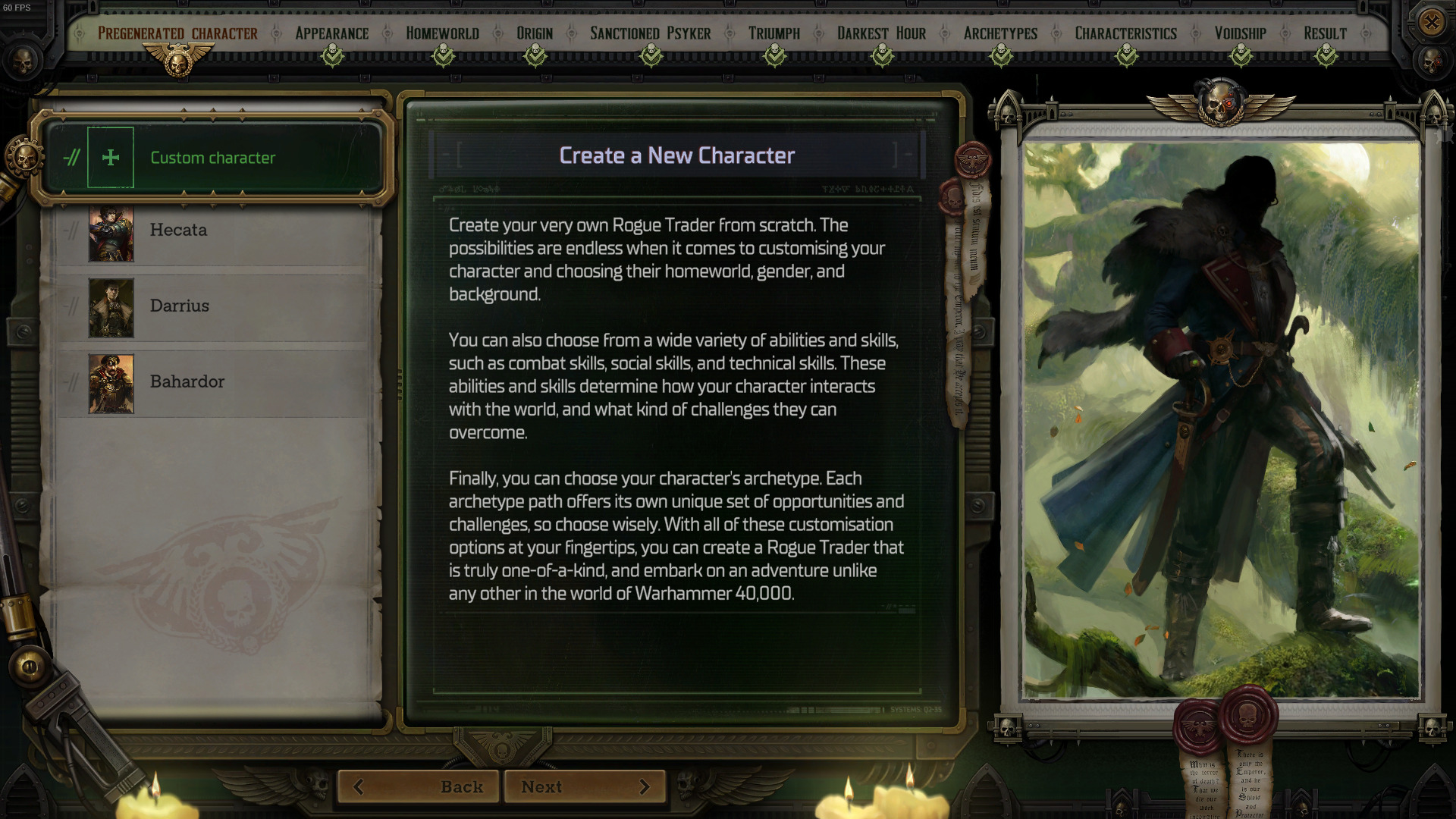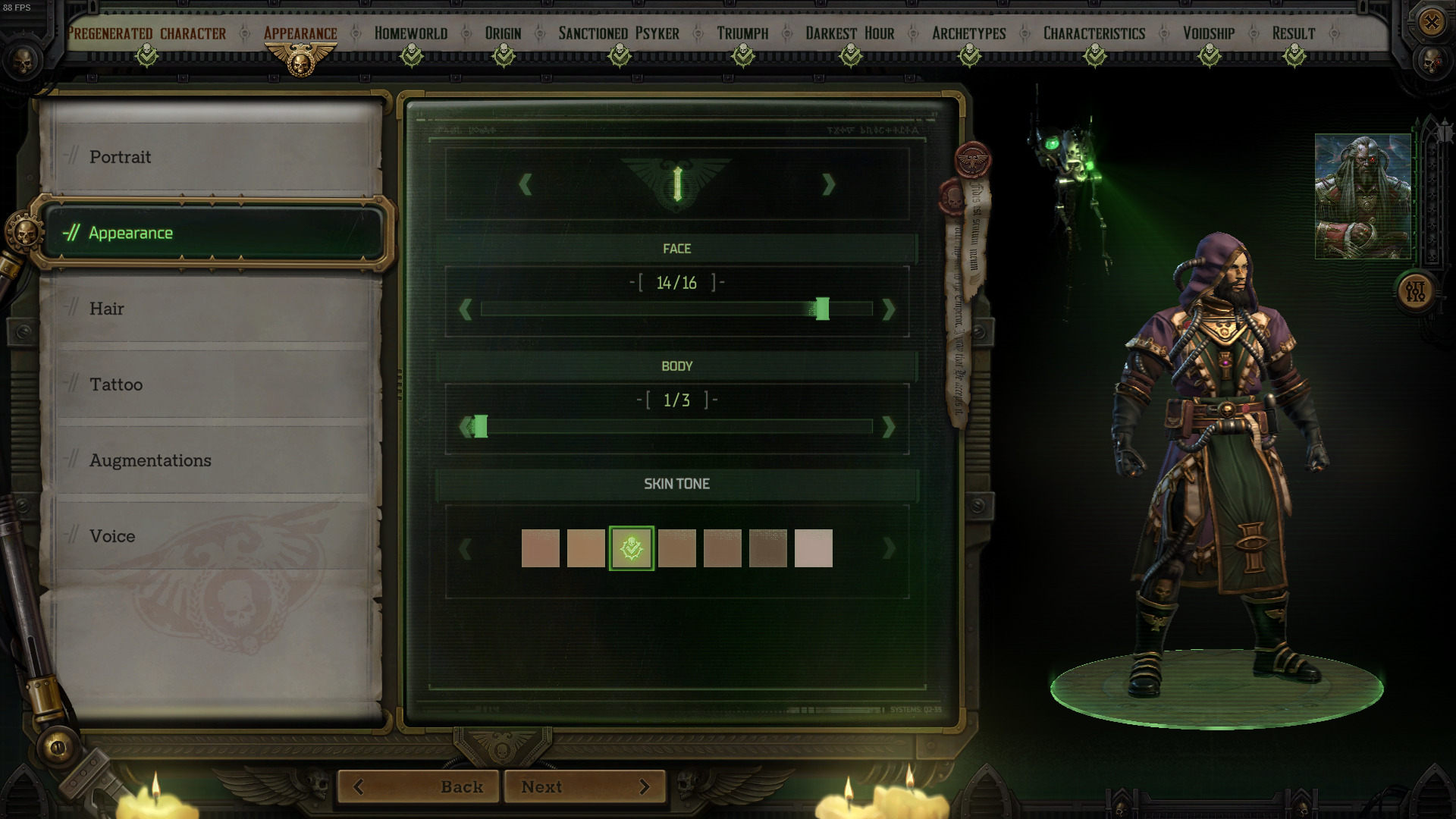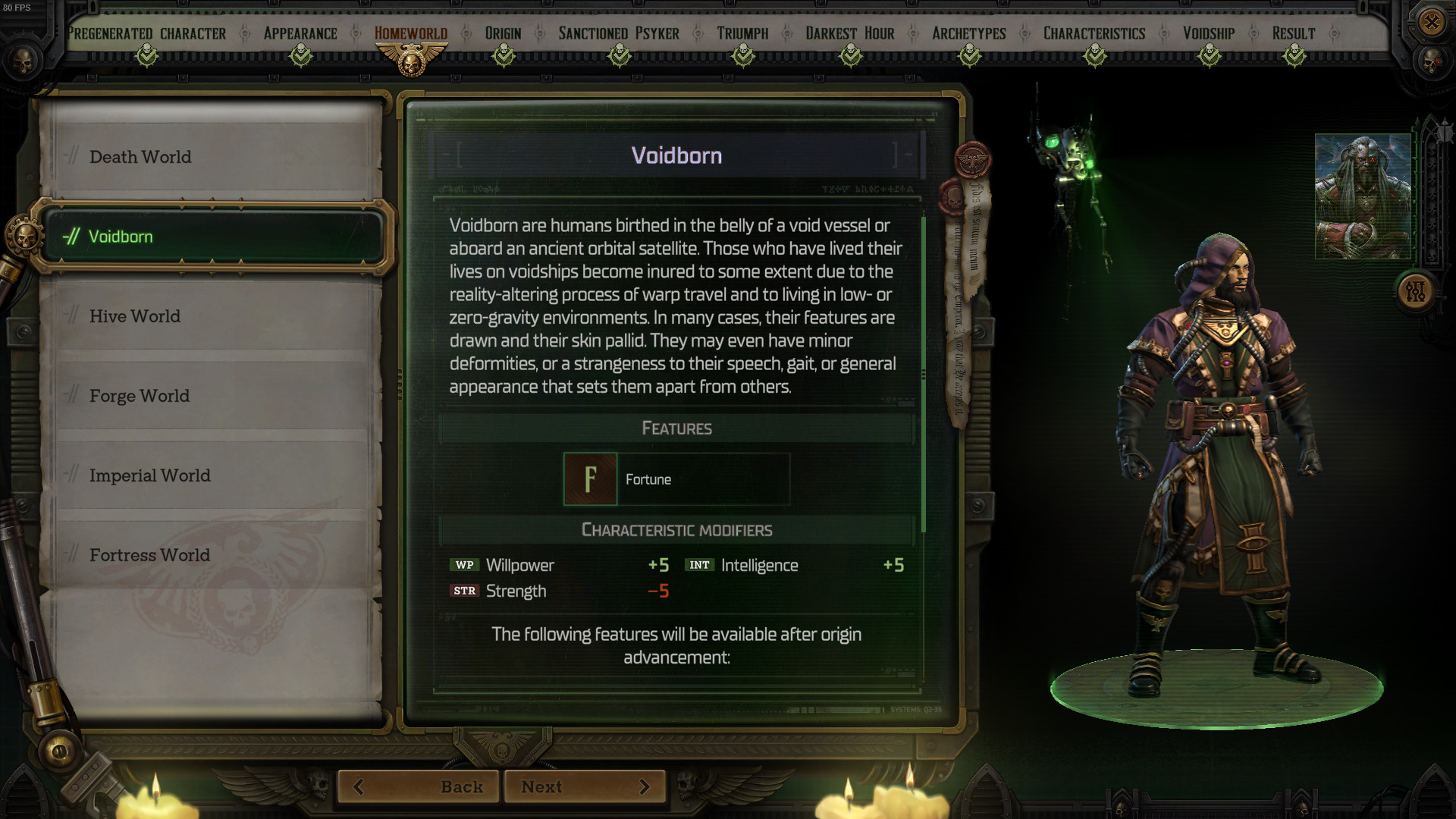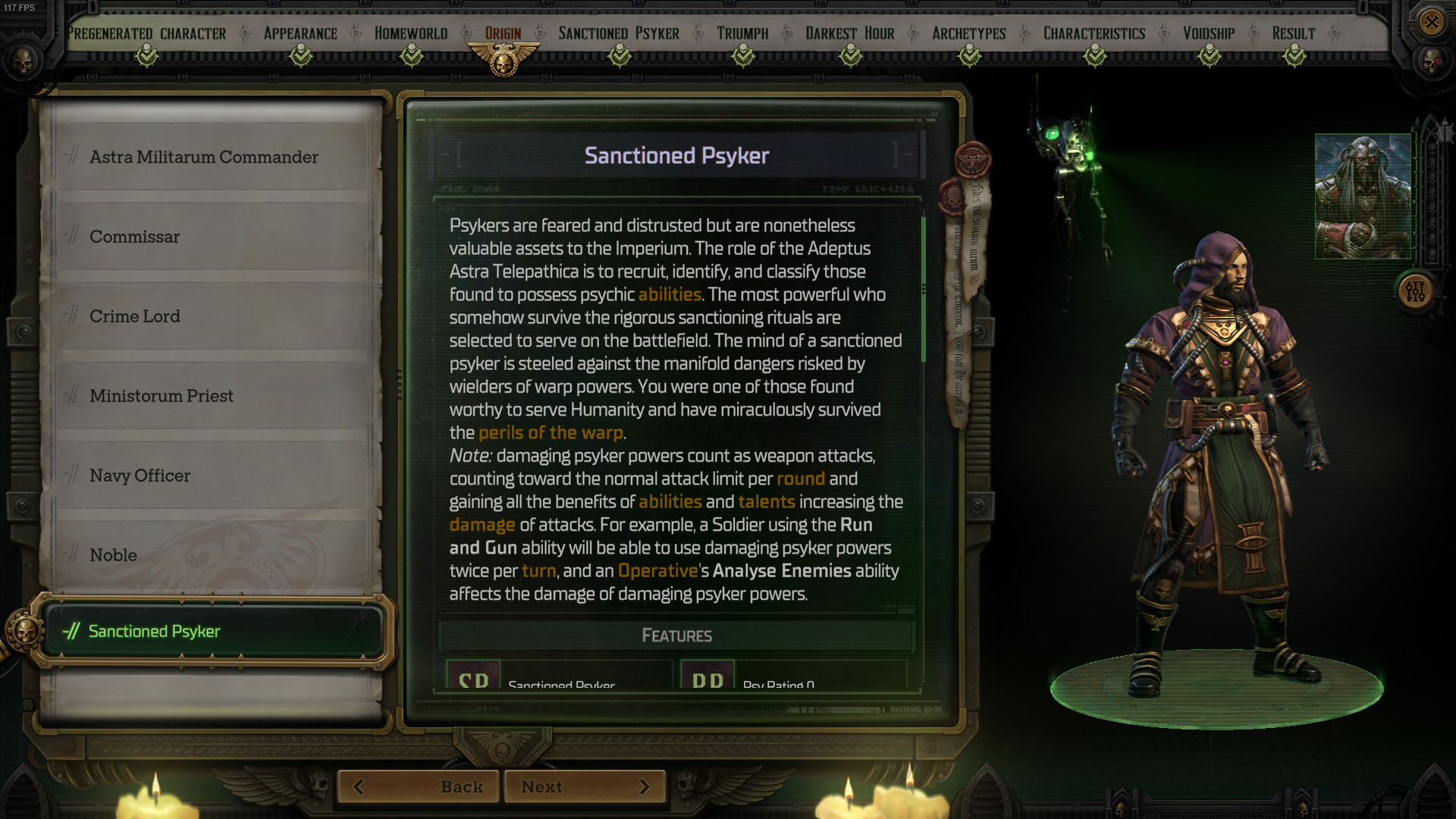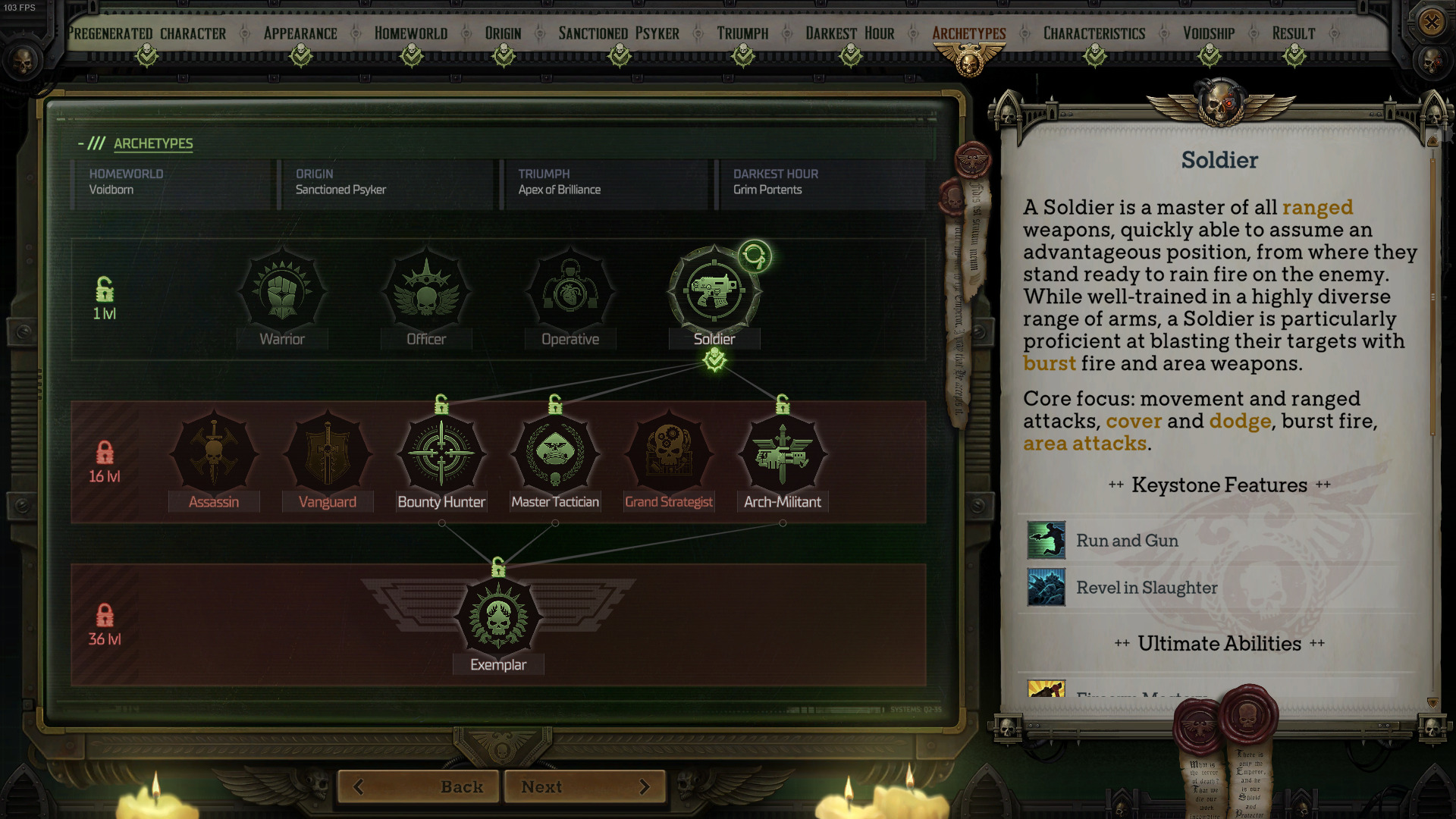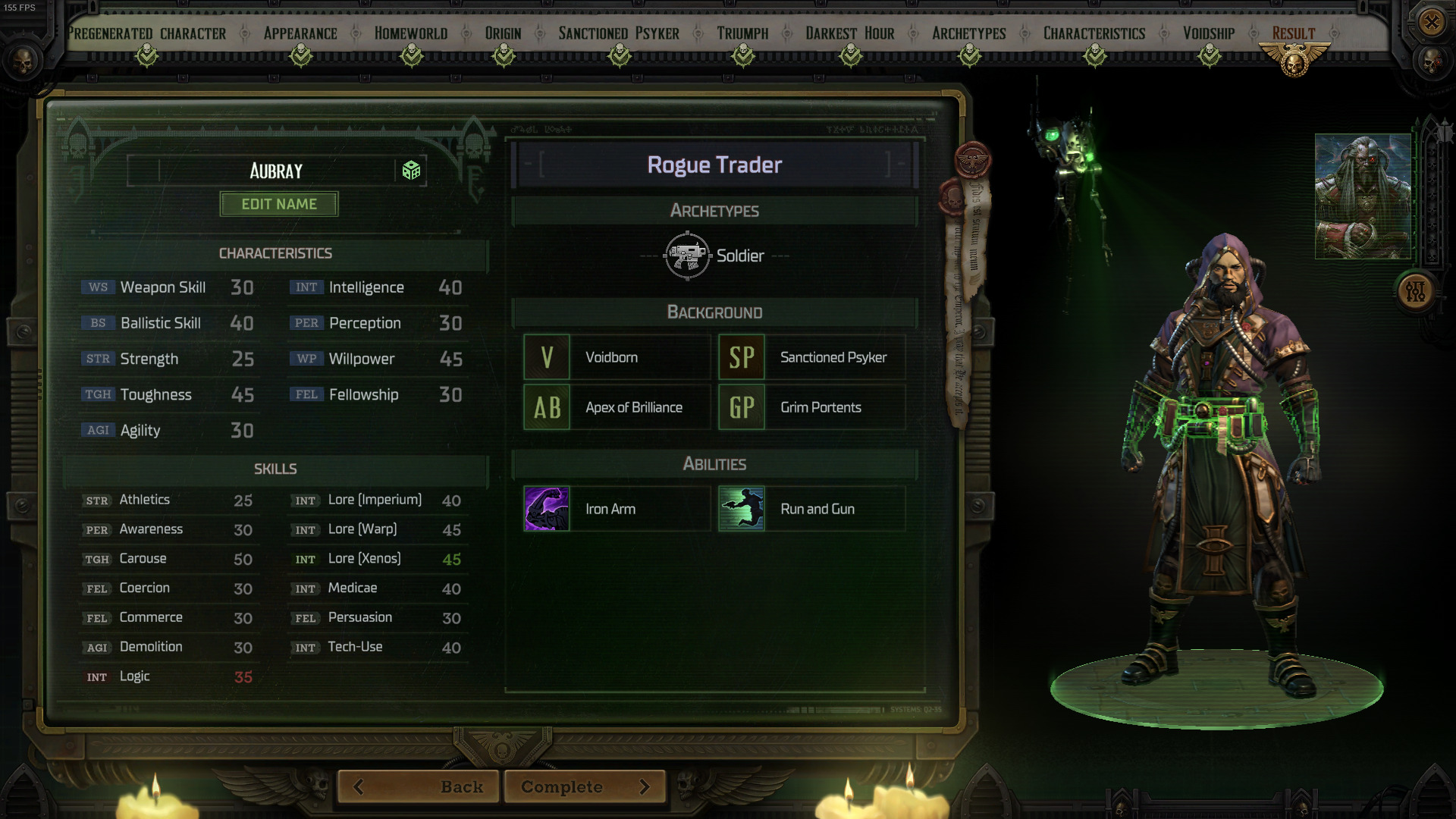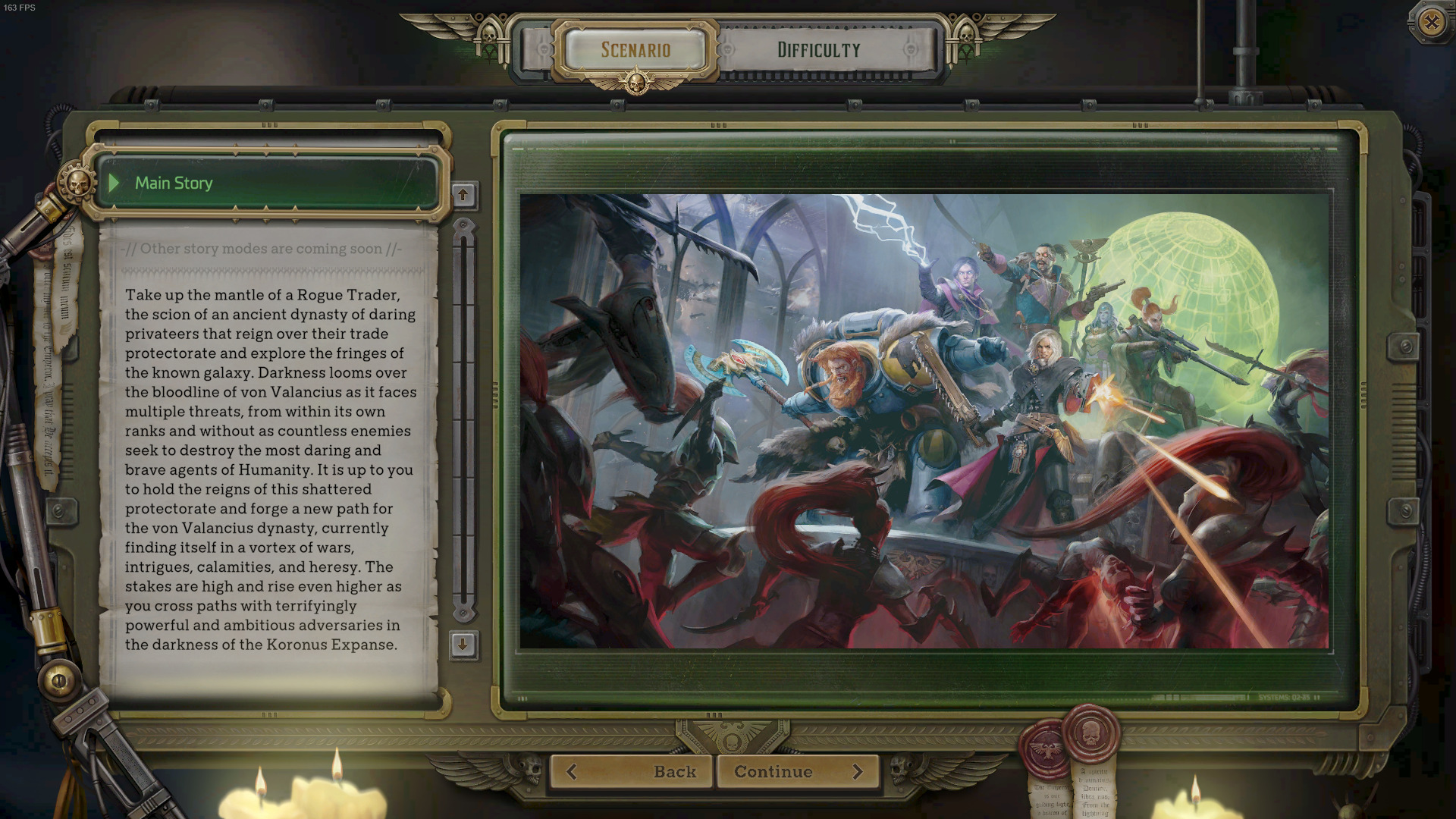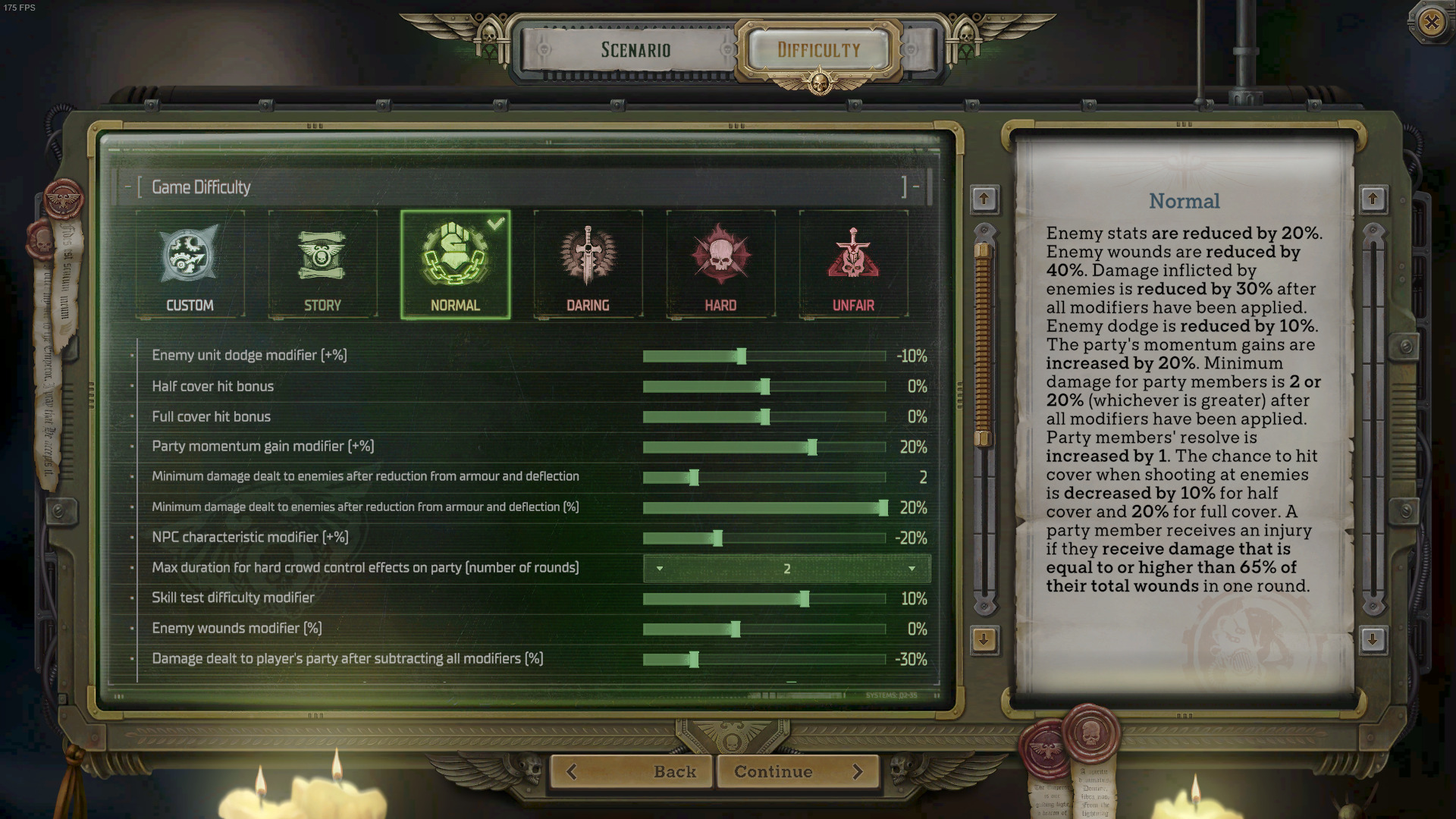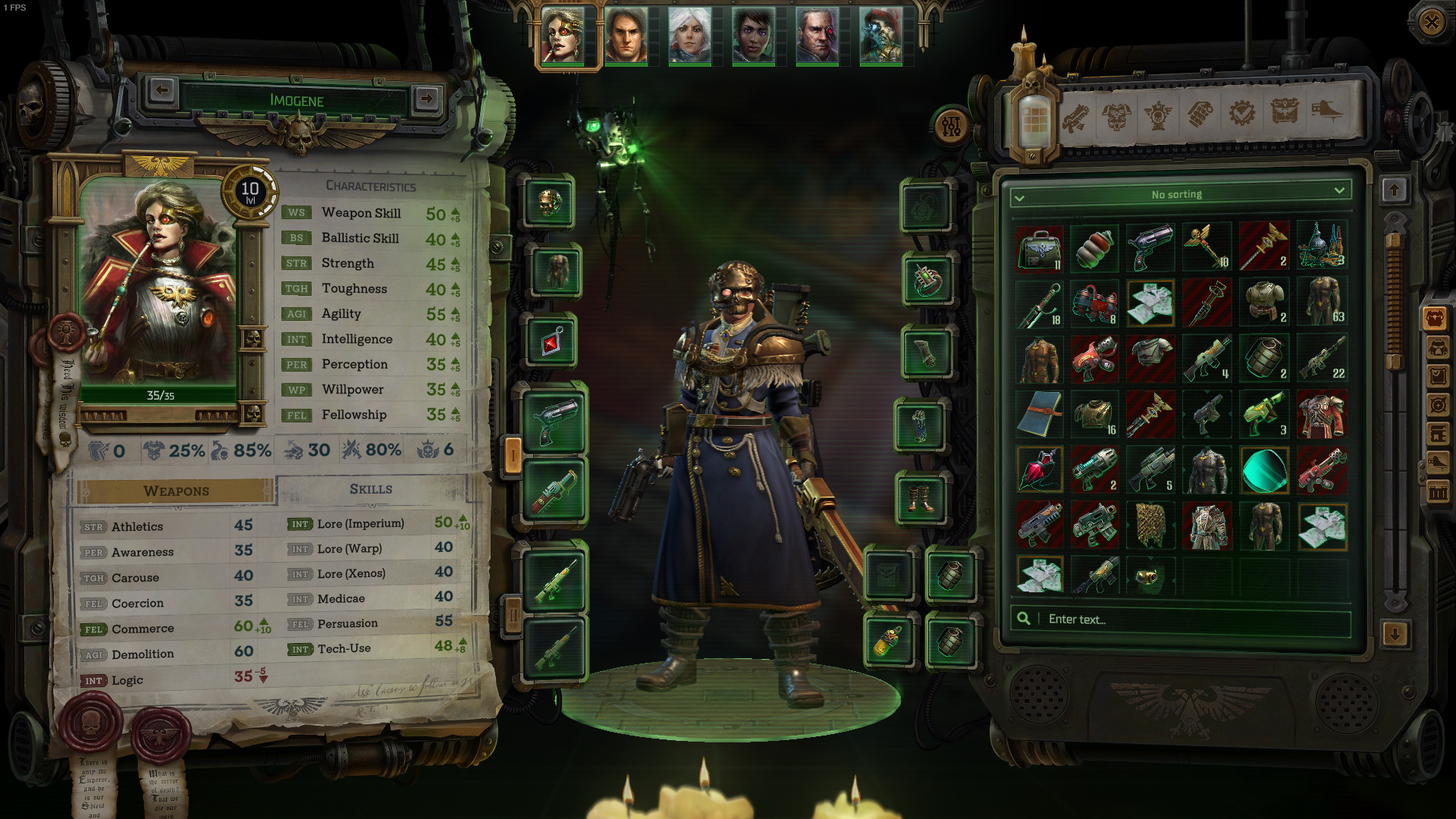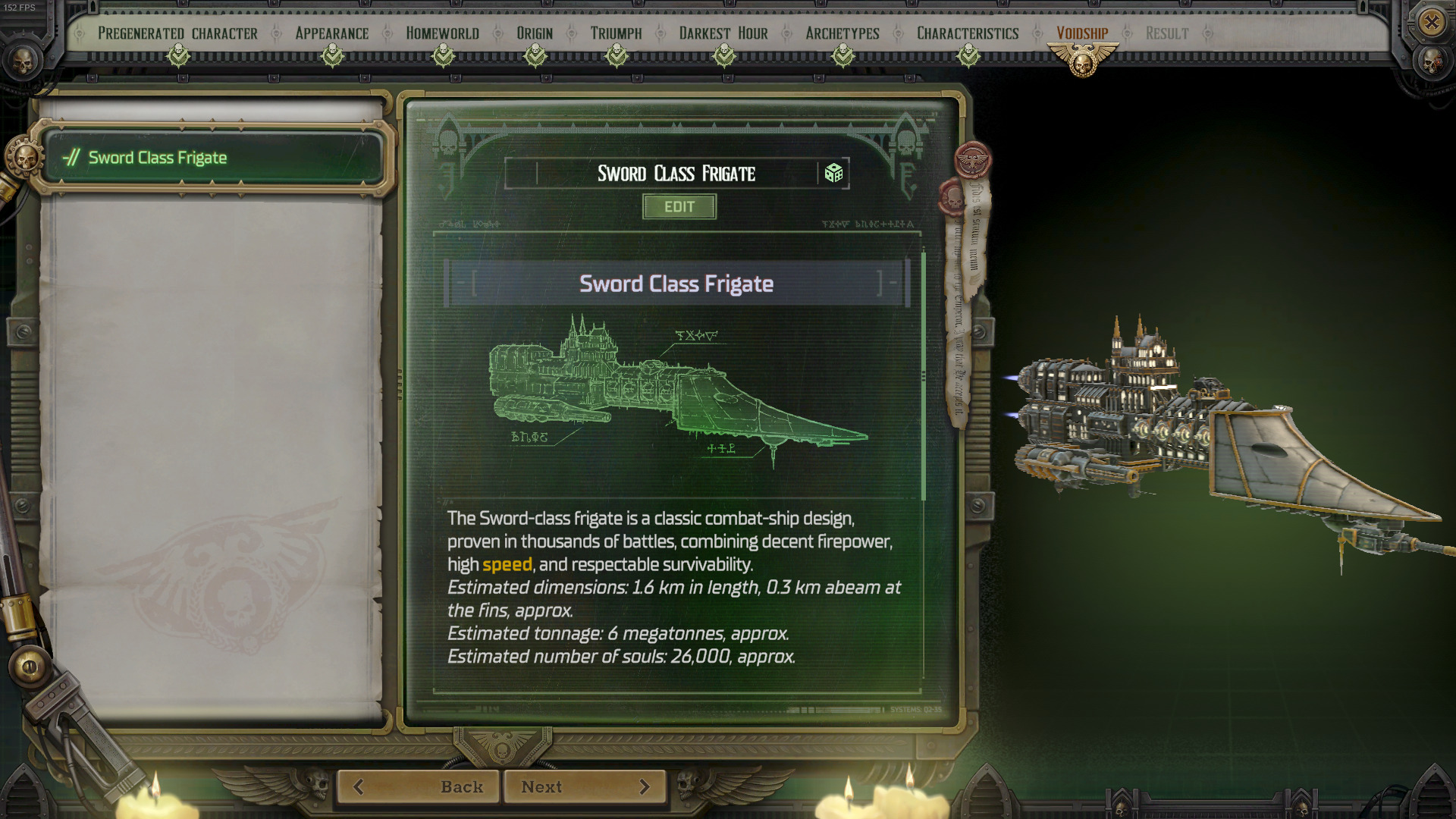Warhammer 40,000: Rogue Trader - Character Creation Guide
Some of the best aspects of Warhammer 40,000 are the sheer amount of dense lore and character choices you can pick; luckily, in Rogue Trader, you have access to most of it's best parts.
by SkulD on Dec 16, 2023
Some of the best aspects of Warhammer 40,000 are the sheer amount of dense lore and character choices you can pick; luckily, in Rogue Trader, you have access to most of its best parts. Creating a potent commander from your choice of several backgrounds, you’ll have the opportunity to mix and match your favorite lore bits.
Sadly, while you can't play as a space marine or a member of the assassinorium, you will have plenty of opportunities to meet them as companions. Therefore, when you're trying to pick up a character that'll properly get you through the game, there are a couple of key things to keep in mind.
The first thing to consider when you start playing Warhammer 40,000: Rogue Trader is if you want to make your character or use a pre-created one. In terms of what you have available for preselected options, there’s Hecata, the Soldier; Darius, the Operative; and Bahardor, the Warrior. Each offers a unique play style that favors ranged, stealth, and melee combat prospectively. That being said, the real fun in this game of choices is the ones you make when you create your character!
In terms of what you make, you have a few choices in classes and other options that might make themselves apparent later in the game. The first option you'll have is to either pick a template portrait or upload your custom template. This is a neat feature as it can make your equipment and character have more personality, especially in cooperative games.
After this, you'll have fairly standard customization options for your appearance. Customization of your character includes face, body, skin, hair, tattoos, augmentations, and voice. All of these are cosmetical but give more charm to your character.
Once you've done this you have your first majorly important choice in the game. This is that of the world you choose so that you can have access to certain traits and abilities associated with them. Your immediate choices are Death World, Voidborn, Hive World, Forge World, Imperial World, and Fortress World.
Each can give you a unique trait that can come into play more often than one might initially expect. Every world includes a feature and stat adjustments that complement them. Additionally, they will have available traits later on once their origin advancement takes place.
To summarize what each ability does, the following playstyle can be adopted from each background:
Death World: This is more of a combat build, favoring ranged and melee weapons. It is great for new players but tends to fall off usefulness-wise as time goes on.
Voidborn: Perfect for psyker builds and those who want to utilize barter and trade. If you don't want to focus on combat, these traits, such as fortune and contagious luck, have a lasting impact on the game.
Hive World: This is an incredibly potent background to pick if you prefer to have access to group combat. With plenty of bonuses for formations and tactics, Hive World is a great strategy overall. Some of these key features allow you to get massive bonuses for grouping your troops with this background.
Forge World: If you want a tanky build or something that can better upgrade the effectiveness of equipment, forge World is the right choice. Giving bonuses to equipment proficiency, toughness, and intelligence is great for navigating a battlefield and sustaining damage.
Imperial World: Imperial worlds are perfect for dogmatic play-throughs as they favor those who stay loyal to the god emperor. They grant strong stat bonuses to versatile builds but otherwise are mostly good for dealing with demons and Xenos threats around the battlefield. Otherwise, they are perfect berserkers with their “Better To Die For The Emperor” ability.
Fortress World: Finally, for a ranged defensive build, the Fortress World can prove to be the most potent option available. It gives you bonuses against opponents who attempt to get too close, along with ranged proficiencies. To put it simply, if you want to use ranged weapons to their fullest, this is the best home world to pick.
Next, in terms of character selection, you’ll have to choose your origin and background. This can be incredibly important because it allows you, as the player, access to certain keystone abilities.
But also grants the player an edge with whatever equipment and armor they want to be used in the future. Unfortunately, you can't just play as a space marine or a sister of battle; however, you can quickly emulate their abilities through certain background and homeworld options.
To summarize each origin and what they're best used for, every origin has a strong and a weak aspect of them. In this way, no one force is better than another, though certain ones are more friendly to new players than others.
Astra Militarum Commander: This origin is perfect for new players who use ranged weapons and are able to command their troops. It gives you bonuses for your ballistic skill, perception, athletics, and medicae. Because of this, you can defend yourself and your allies more efficiently. Additionally, the use of talents like suppression, fire, and unflinching heroism can greatly change the flow of a conflict.
Commisar: the commissar is the perfect class to focus more on melee weapons and commanding your units. They excel at traits similar to the Militarum commander but focus more on charging the enemy. Where the commander may focus on defensive warfare, traits like a show of contempt for the emperor make it clear what this origin is for. You can quickly steam-roll opponents while maintaining control over your forces easily.
Crime Lord: For a more strategic/ stealthy option, the Crime lord is decent at maximizing intelligence and awareness. Focusing on plans rather than commands, the crime Lord can enact prepared actions that turn the game into a well-oiled machine of death and destruction. Additionally due to the moral flexibility of this origin playing heretical characters can be made especially easy.
Ministorum Priest: For players who want to play more like a sister of battle or just avoid demons in general, the priest is for you. Focusing less on combat and more on skills and toughness, this bastion of light protects their comrades from the forces of heresy. Skills like a shield of faith and a Litany of Purification make them perfect support troops in an otherwise uphill battle.
Navy Officer: For void ship-related builds, the Navy Officer focuses their abilities on defense, commerce, and ship combat. As such, they often have demolition and commerce skills while also spending their time commanding their allies. With talents like scatter and get into cove,r navy officers also offer a unique means of a mobile play style.
Noble: Having a more effective commanding force at your disposal is all the skills the noble desires. In terms of fighting styles, they choose to make their allies get in the direct line of fire of themselves like lackeys. In effect, everything becomes a piece on a chess board, and you are the king of the game. As a result, they can command their troops to trigger certain specific actions only a noble can perform, such as making them take their turn out of order.
Sanctified Psyker: Finally, for those who enjoy a mage or cleric-style built-in gameplay, we have psykers. These unique forces are useful for making the warp bend to their will. As a result, you will gain access to warp powers based on the specific kind of Psyker you become. This is a generally hard class to use and has a lot of risks associated with it. Nonetheless, if you enjoy being a magic caster, psykers are the next best thing. Because of their moral flexibility, you can play them at almost any alignment or ideology with relative ease.
After you choose your origin, you will often have access to your triumphs next. These are the special features that make you qualified to become a Rogue Trader. Mostly, these break down into flavor text between an intelligence bonus to the lore of Xenos, persuasion, or coercion.
Each is interesting in its own right but should ultimately be used to complement the specific Playstyle you'd like to incorporate in your own game. For instance, coercion is great for making people do actions more efficiently, and persuasion can increase the likelihood of good actions happening. On the other hand, you can choose the lore bonus to get an advantage when using artifacts you find in the wild.
Next, you'll have to choose a flaw in the way of your “Darkest Hour”. This can range between three options: a grim portent, which lowers your logic, and a brand of shame, which lowers your awareness. Finally, you have access to a shadow of torment that affects your knowledge of the warp.
While each offers a disadvantage in one skill or another, they can surprisingly make your story more flavorful and interesting. It's important to note that whatever you choose should complement whatever feature of the game you aren't interested in Indulging in. For instance, a ranged fighter might need to have a keen knowledge of the warp itself.
Beyond these crucial decisions for making your character, you'll finally reach the screen that decides your class archetype. These will be important as they can branch out after level sixteen before finally reaching the Exemplar archetype. The basic class types are the warrior, officer, operative, and soldier. Each of these is incredibly potent in its own right but also breaks off into its subclasses, depending on which you choose. Some of these overlap and can become the same choice, but ultimately, your skills will remain different.
Warrior: As the melee combatant’s primary choice, the warrior focuses on moving forward in combat and dealing with physical damage. They can enter into the subclasses of assassin, vanguard, and arch-militant. Affectionately, they choose to focus on charging the enemy down and eventually wiping them out in brutal melee combat. Their ultimate is known as breaching strike, where they can move forward and strike additional times.
Officer: Using more strategy and wit-related combat, the officer can manipulate their units and open up advantages. Rather than gaining any specific combat bonuses, the officer maintains the ability to grant extra turns to their party. This can be incredibly potent when starting out but becomes more useful as time goes on.
Flat out for experienced players, the officer is one of the best archetypes to go down. It can eventually become a vanguard, master tactician, or grand strategist in terms of archetypes at level 16. The officer's ultimate move is called the finest hour, which grants a character two extra turns worth of actions in a single turn.
Operative: When stealth and scouting are at the heart of your strategies, the operative has your back. As a play style focused on debuffing the enemy and sabotaging them in combat, it works well to analyze weaknesses and take advantage of them.
With subclasses available like the assassin, bounty hunter, and grand strategist, you have a pretty diverse set of options for how you set them up. Overall, they like to prepare themselves and deal with big damage when an enemy comes within range. Because of this, their special attack called dismantling attack can cripple enemies while dealing massive damage to them.
Soldier: For ranged combat and getting up close as best as you can without being a space marine, the soldier class is for you. This unique blend of aggressive action and ranged warfare is exceptional for taking on opponents at any level.
Being able to pursue subclasses like the bounty hunter, master tactician, and arch-militant, the soldier has definite damage-dealing potential. Moreover, the special ability of firearm mastery allows the soldier to dump their entire magazine quickly and aggressively in one turn. This can come from bursts of fire or singular shots that make this class deadly at medium distances.
Once you've chosen your archetype and have that squared away, you will be able to choose your characteristics. These will directly impact which skills you have bonuses in once you've finished up. The main choices for your characteristics can impact your character in different ways, including how it interacts with combat and other scenarios. For the most part, each skill interacts with characters in the following ways:
Weapon Skill: Directly impacts your skill with melee items, including how likely an opponent is to parry or dodge away from you. It additionally can impact the way that critical damage is applied to an opponent you damage.
Ballistic Skill: Interacts with your accuracy and likelihood of actually dealing a killing blow with ranged weapons. The higher this skill is, the more likely you are to deal critical damage with ranged weapons, along with hitting them in general.
Strength: Allows for an increase or decrease in melee combat damage depending on how high or low it is. So long as you have a bonus in this skill, all melee damage will be more effective. Vice versa, any time you have a negative in this skill, you will be at a disadvantage with these melee weapons.
Toughness: Directly impacting the number of health points your character has along with the amount of wounds they can sustain. Additionally, this skill is incredibly important when considering your character's disease and poison resistance.
Agility: impacting your ability to dodge, and parry, as well as your movement speed, agility is an important stat to not undermine. More than anything, this game can be made easier or harder simultaneously by the level of advantage you have over agility. For this reason, it's important to have high agility if you're going to use heavy armor, or else you'll just become a damage sponge.
Intelligence: Impacting the most overall skills and talents, intelligence is a potent trait to put points into over time. High intelligence is especially important if you are running a tech or medicine-related build as they are directly amplified by this stat. Additionally, intelligence is perfect for psyker users, along with willpower, as it amplifies the damage they deal with.
Perception: Only being important for your awareness of your surroundings and combat, this stat can help you identify loot and opportunities around you. Very importantly, this can allow you to get sneak attacks on the enemy by having a heightened awareness of your surroundings. Additionally, this skill helps increase the accuracy of your strikes and Psyker attacks.
Willpower: Will can be one of the most important aspects of a psyker or those interacting with the warp itself. This stat can help save you from the terrible horrors the warp can inflict upon you, as well as help you keep control of yourself. This type of stat is important to keep nourished, or you'll have a massive number of demons coming out of your characters.
Fellowship: This stat directly accounts for your ability to deal with social situations. Being able to charm, persuade, coerce, or deceive individuals all fits along the lines of this ability. Most importantly, this skill increases the effectiveness of your commands and other abilities as an officer or operative. If you want to have a more effective time conducting your forces, fellowship is the stat for you.
Agility: Impacting your ability to dodge, and parry, as well as your movement speed, agility is an essential stat to not undermine. More than anything, this game can be made easier or harder simultaneously by the level of advantage you have over agility. For this reason, it's important to have high agility if you're going to use heavy armor, or else you'll just become a damage sponge. Agility is great for most archetypes, including bounty hunters and assassins. However, only a few skills, like athletics, are reliant on your character's agility.
Intelligence: Impacting the most overall skills and talents, intelligence is a potent trait to put points into over time. High intelligence is especially needed if you are running a tech or medicine-related build, as they are directly amplified by this stat. Additionally, intelligence is perfect for psyker users, along with willpower, as it amplifies the damage they deal with. Lastly, intelligence ranges around the most skills, including tech use.
Perception: Only being used for your awareness of your surroundings and combat, this stat can help you identify loot and opportunities around you. Very importantly, this can allow you to get sneak attacks on the enemy by having a heightened awareness of your surroundings. Additionally, this skill helps increase the accuracy of your strikes and Psyker attacks. Perception is essential for disarming traps and sniper builds but otherwise has little that can offer itself to the player.
Willpower: Will can be one of the most appreciated aspects of a psyker or those interacting with the warp itself. This stat can help save you from the terrible horrors the warp can inflict upon you, as well as to keep control of yourself. This type of stat is important to keep nourished, or you'll have a massive number of demons coming out of your characters. Willpower can also help resist the damage of other psykers, building up a better resistance.
Fellowship: This stat directly accounts for your ability to deal with social situations. Being able to charm, persuade, coerce, or deceive individuals all fits along the lines of this ability. This skill increases the effectiveness of your commands and other abilities as an officer or operative. If you want to have a more effective time conducting your forces, fellowship is the stat for you. Skills like commerce can be greatly improved by this ability.
Subscriber, NoobFeed
Latest Articles
No Data.


